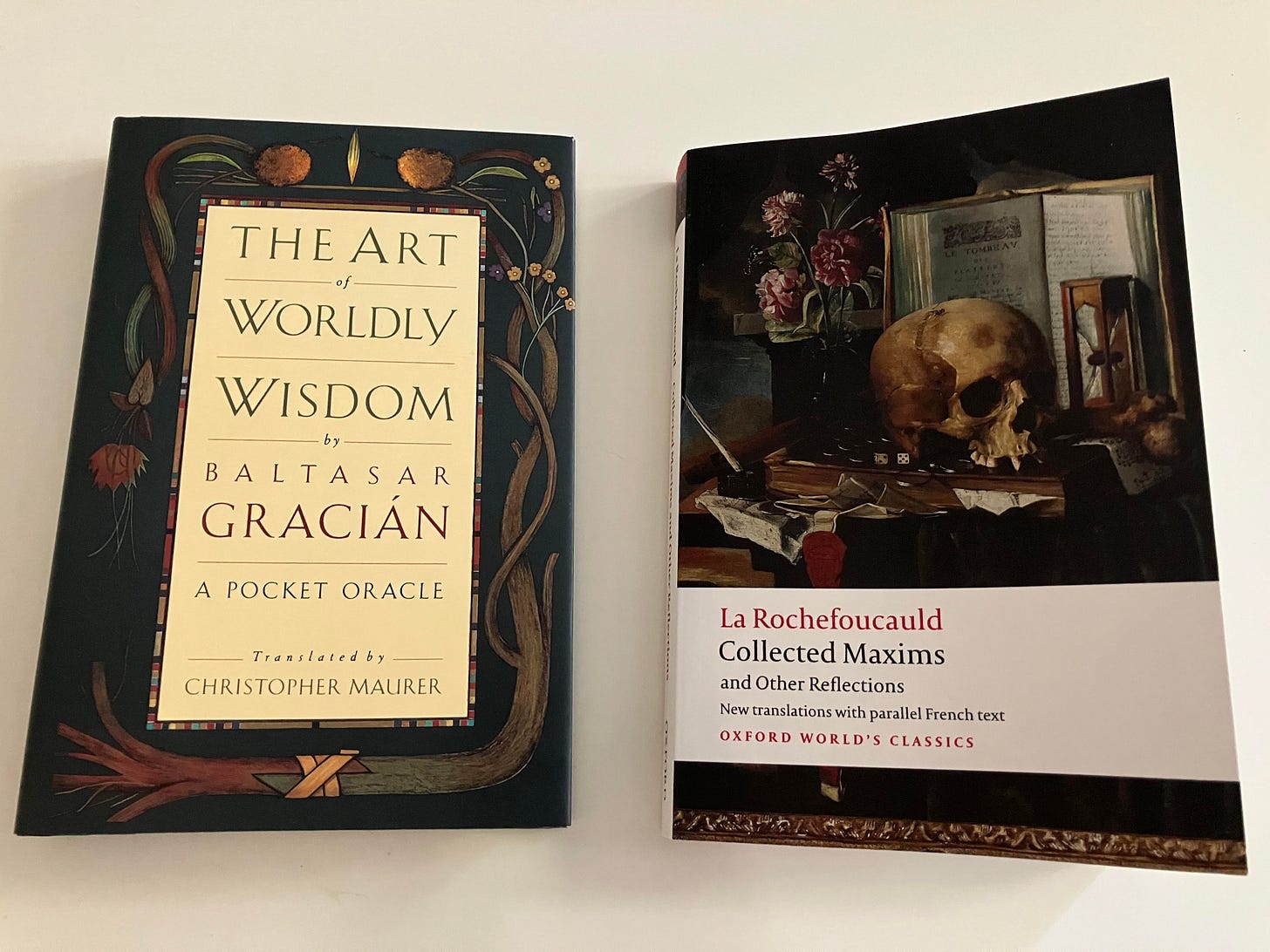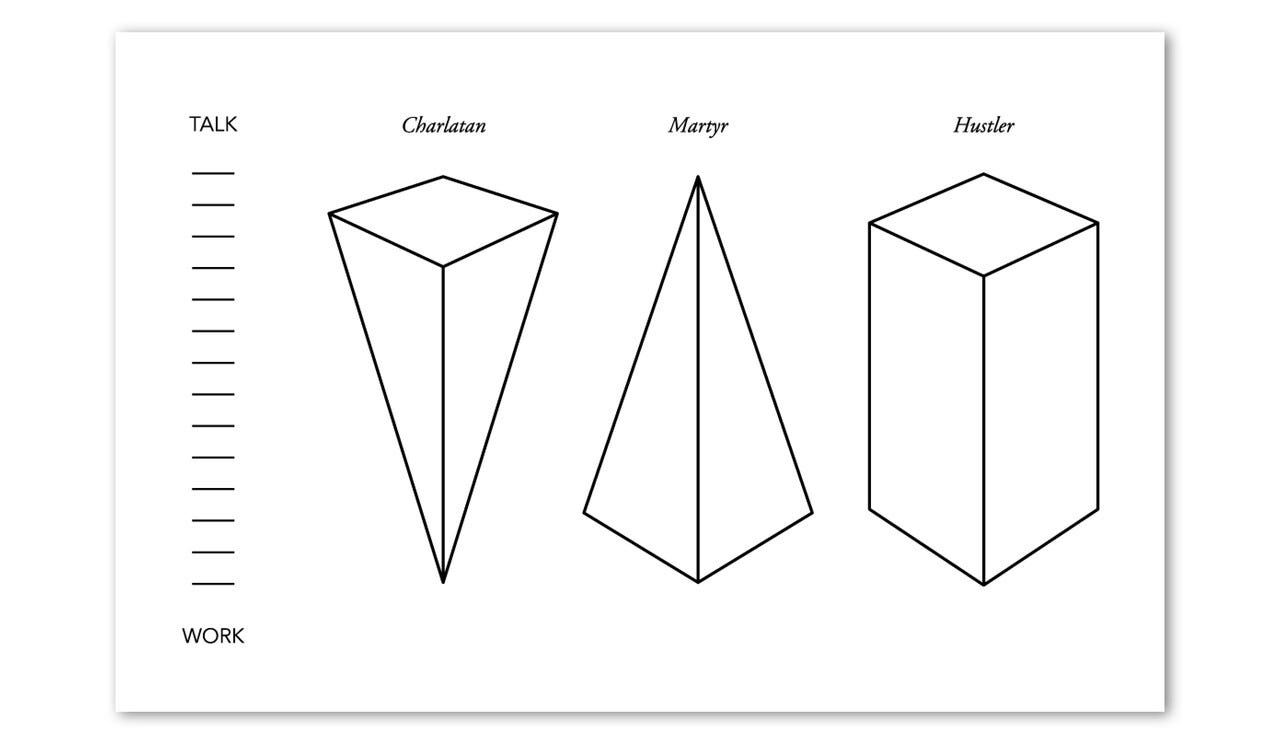Ethically Shrewd
I like aphorisms.
Laconic sentences that strip away bullshit and reveal uncomfortable truths.
Without question, the best in the game is Colombian moralist Nicolás Gómez Dávila. To illustrate:
“Politics is the pastime of empty souls.”
“To refuse to wonder is the mark of the beast.”
“There is an illiteracy of the soul that no diploma cures.”
After reading a Dávila aphorism I usually react like Joe Rogan does during a UFC match.
Dávila is indispensable. You can read banger upon banger of his here:
Today, I’ll highlight two other aphorists: Baltasar Gracián (1601–1658), a Jesuit priest, and Duc de La Rochefoucauld (1613–1680), a French nobleman. Their books, The Art of Worldly Wisdom and Maxims, published 20 years apart, are primary texts that make up an aphoristic genre we might call “ethically shrewd.”
To be shrewd is to exercise clear judgment in practical affairs with clever responses. It is the ability to meet reality as it is, which requires seeing reality as it is, especially human reality. Too many “philosophers” and political ideologues suffer from a kind of reality-blindness, disregarding the messy complexity of what is in favour of their clean theories of what should be.
To be ethically shrewd, then, is to see reality clearly yet respond with moral integrity. However, given that many worldviews today punish seeing things with clarity, the mere acknowledgment of difficult-to-swallow truths is deemed bad, if not outright evil. At the very least, speaking such truths can feel deeply naughty.
Alas, for less foolish souls, such understanding is crucial, and one must risk appearing naughty to fools. Purchase these books without delay. You will not agree with every passage, nor should you. Rather, absorb their gestalt and grow ethically shrewd.
I’ll provide examples, with commentary, from each book. A few from Gracián
Neither all bad nor all good. A certain sage reduced the whole of wisdom to the golden mean. Carry right too far and it becomes wrong. The orange squeezed completely dry gives only bitterness. Even in enjoyment you shouldn’t go to extremes. The intellect itself will go dry if pressed too hard, and if you milk a cow like a tyrant you will draw only blood.
As a default, anyone who appears too moral and virtue-signals (or “vice-signals”) too hard is not to be trusted. One who cares about the truth will find himself in contradiction often. Following the spirit of truth not only leads to more interesting minds, but fuller souls, than those who demand rigid coherence to a worldview.
Do, but also seem. Things do not pass for what they are, but for what they seem. To excel and to know how to show it is to excel twice. What is invisible might as well not exist. Reason itself is not venerated when it does not wear a reasonable face. Those easily duped outnumber the prudent. Deceit reigns, and things are judged from without, and are seldom what they seem. A fine exterior is the best recommendation for inner perfection.
Mimicry is natural. It’s also human nature, which includes sophists, fakers, and bullshitters. Yet, of course, there is evolutionary advantage to such mimicry, so much so that the world itself has untethered appearance from reality. You want to be the real deal, yet you’ll need the capacity to show you are as well; a separate skill. A maxim well represented by this Joey Roth illustration:
Don’t answer those who contradict you. Find out first whether they’re being clever or simply vulgar. It isn’t always stubbornness; sometimes it is a trick. So pay attention and don’t get caught up in the former or cast down by the latter. No one demands more caution than a spy, and when someone has the skeleton key to minds, counter him by leaving the key of caution inside, on the other side of the keyhole.
Don’t define yourself by those who disagree with you. By taking the bait and engaging, however valid their critique, you bind yourself to them in unseen ways, creating an unspoken pact that cannot easily be broken. Rarely are disagreements, public or private, bounded by a pure pursuit of truth.
Deep down, the disagreer wants something: information, leverage, attention, validation from their audience, or simply emotional highs that come from being vindictive or triumphant. Sometimes it’s wise to engage, but often it’s best to ignore fools and let your silence be your disagreement.
The whole book is amazing, with 300 passages in total. La Rochefoucauld’s, closer to the style of Dávila, are equally good. Here are some, with select thoughts from me.
“Those who devote too much attention to little things generally become incapable of great ones.”
“To gain status in the world, we do all we can to appear as if we had already gained it.”
“With most men, love of justice is merely fear of suffering injustice.”
As my friend Tony Robbins, the great modern self-help sage, likes to say: avoiding pain is a greater motivator than pleasure. Watch carefully those with political aspirations, especially those who cultivate the appearance of being a “good person” or advocate a highfalutin cause; underneath their ethical veneer is self-interested fear of facing a painful fate, real or imagined.
“Not all those who know their own minds know their own hearts.”
“As great minds have the ability to say much in few words, so, conversely, small minds have the gift of talking much and not saying anything.”
“No fools are as annoying as intelligent ones.”
Intelligence, especially when coupled with verbal strength, offers an undeniable power. A game emerges for those who can abuse it: appear right, a proxy for being smart, at all costs, even if that means making another appear wrong and hence stupid. Being around such fools is like being surrounded by flies while eating. They do not cause serious harm, but you cannot easily get rid of them and must live with their uninvited irritation.
“Few people know how to be old.”
“Nature creates merit, and fortune puts it on display.”
“To draw attention to the fact that you never flirt is itself a form of flirtatiousness.”
Guilty as charged!
Only the ethically shrewd know how to meta-flirt. 😉
You should keep these books by your bedside, but not too close.
Understanding the reality of others helps tremendously in living a less foolish life, but being too shrewd carries a weight that zaps the joy out of all social life. In the spirit of the above passages, I’ll close this entry with one of my own, serving as counterweight…
Be shrewd with all, but for those you live for, allow yourself to be lovingly naïve. Recognizing the beauty in them invites more of it.




